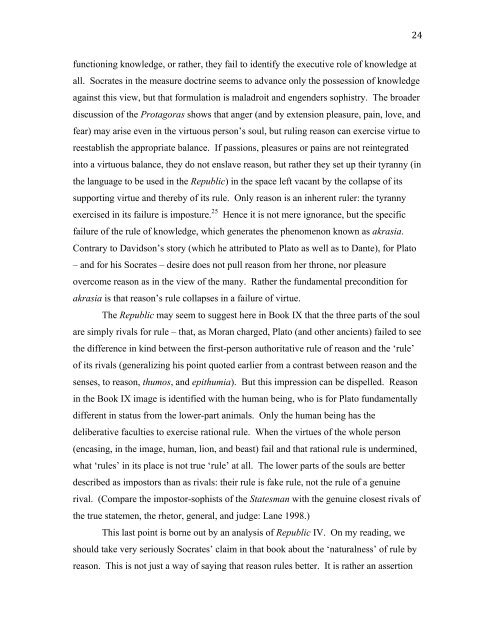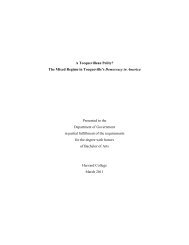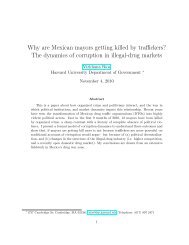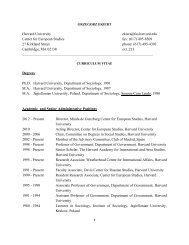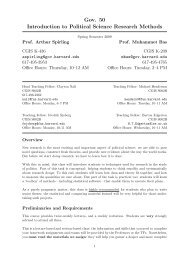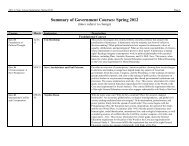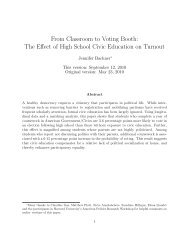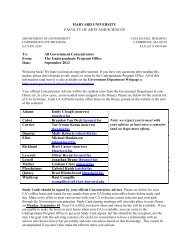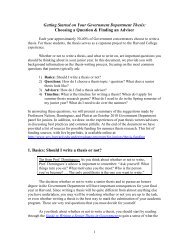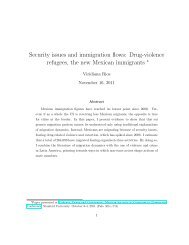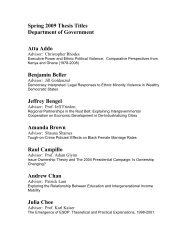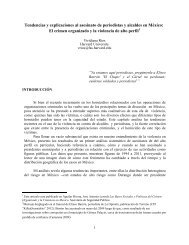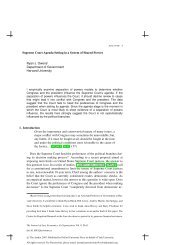1 Harvard University Political Theory Colloquium For 11 March 2010 ...
1 Harvard University Political Theory Colloquium For 11 March 2010 ...
1 Harvard University Political Theory Colloquium For 11 March 2010 ...
You also want an ePaper? Increase the reach of your titles
YUMPU automatically turns print PDFs into web optimized ePapers that Google loves.
24 <br />
functioning knowledge, or rather, they fail to identify the executive role of knowledge at<br />
all. Socrates in the measure doctrine seems to advance only the possession of knowledge<br />
against this view, but that formulation is maladroit and engenders sophistry. The broader<br />
discussion of the Protagoras shows that anger (and by extension pleasure, pain, love, and<br />
fear) may arise even in the virtuous person’s soul, but ruling reason can exercise virtue to<br />
reestablish the appropriate balance. If passions, pleasures or pains are not reintegrated<br />
into a virtuous balance, they do not enslave reason, but rather they set up their tyranny (in<br />
the language to be used in the Republic) in the space left vacant by the collapse of its<br />
supporting virtue and thereby of its rule. Only reason is an inherent ruler: the tyranny<br />
exercised in its failure is imposture. 25 Hence it is not mere ignorance, but the specific<br />
failure of the rule of knowledge, which generates the phenomenon known as akrasia.<br />
Contrary to Davidson’s story (which he attributed to Plato as well as to Dante), for Plato<br />
– and for his Socrates – desire does not pull reason from her throne, nor pleasure<br />
overcome reason as in the view of the many. Rather the fundamental precondition for<br />
akrasia is that reason’s rule collapses in a failure of virtue.<br />
The Republic may seem to suggest here in Book IX that the three parts of the soul<br />
are simply rivals for rule – that, as Moran charged, Plato (and other ancients) failed to see<br />
the difference in kind between the first-person authoritative rule of reason and the ‘rule’<br />
of its rivals (generalizing his point quoted earlier from a contrast between reason and the<br />
senses, to reason, thumos, and epithumia). But this impression can be dispelled. Reason<br />
in the Book IX image is identified with the human being, who is for Plato fundamentally<br />
different in status from the lower-part animals. Only the human being has the<br />
deliberative faculties to exercise rational rule. When the virtues of the whole person<br />
(encasing, in the image, human, lion, and beast) fail and that rational rule is undermined,<br />
what ‘rules’ in its place is not true ‘rule’ at all. The lower parts of the souls are better<br />
described as impostors than as rivals: their rule is fake rule, not the rule of a genuine<br />
rival. (Compare the impostor-sophists of the Statesman with the genuine closest rivals of<br />
the true statemen, the rhetor, general, and judge: Lane 1998.)<br />
This last point is borne out by an analysis of Republic IV. On my reading, we<br />
should take very seriously Socrates’ claim in that book about the ‘naturalness’ of rule by<br />
reason. This is not just a way of saying that reason rules better. It is rather an assertion


